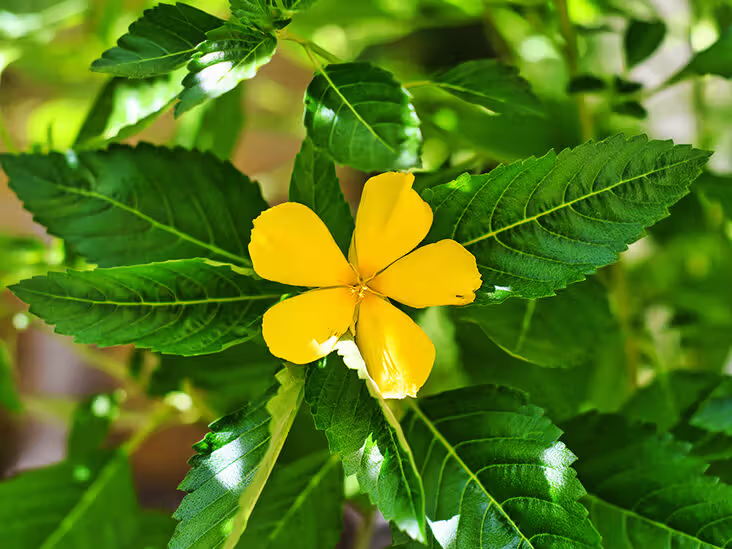
Scientific Name
Turnera diffusa
Common Names
Damiana
Plant Family
Passifloraceae
Location
Native to Mexico, Central America, and the Caribbean. Grows in dry, sunny Locations — scrubland, rocky slopes, and tropical forest edges. Prefers well-drained, sandy soils.
Description
Small, fragrant shrub with narrow, serrated leaves and small yellow flowers. The scent is sweet, resinous, and slightly spicy. Leaves are harvested just before or during flowering.
Uses
Traditionally valued for its aphrodisiac, nervine, and mild tonic properties, especially in conditions of sexual weakness, fatigue, and low libido. It is used to promote relaxation and mood enhancement, helping ease mild anxiety, stress, and nervous tension. There is evidence for its antioxidant activity (high phenolic/flavonoid content) which supports protection against oxidative stress in tissues. Some studies suggest damiana might help with digestive issues—mild stomach discomfort, possibly acting as a digestive bitter and soothing mild gastric upset. It has also been used historically for urinary conditions, mild diuretic actions, and as a urinary tonic. Other traditional uses include supporting menstrual health, bladder health, perhaps supporting mild hypoglycemic effects, and general energy boosting. However, many of these effects are supported by ethnobotanical or preclinical evidence rather than large human trials.
Energetics
Warming, drying, aromatic. Stimulating to the nervous and reproductive systems. Uplifting without being overly agitating.
Parts Used
Leaf (dried)
Constituents
Volatile oils (cineole, thymol), flavonoids, arbutin, resins, cyanogenic glycosides (traces)
Dosage
- Infusion: 1–2 tsp per cup, steep 10 min
- Tincture (1:5): 30–60 drops, 2–3x/day
- Smoking blends: Often included in herbal smokes
Notes on Use
Damiana is warm, charming, and slightly flirtatious. It’s great when someone is stuck in low mood, low energy, and low sensuality. Use it for emotional shutdown as much as sexual stagnation. Great in combination with cacao, rose, or cinnamon for love tonics or joy elixirs.
Harvesting
• Leaves are gathered in full bloom, dried gently, and stored airtight.
Contraindications
Avoid in pregnancy or with urinary irritation. High doses may cause insomnia or headache in sensitive people.
Recipes
- Heart & Joy Elixir: Damiana, rose, cacao, vanilla in honey/brandy
- Sensual Smoke Blend: Damiana, rose, mullein
- Uplifting Tea: Damiana, lemon balm, holy basil